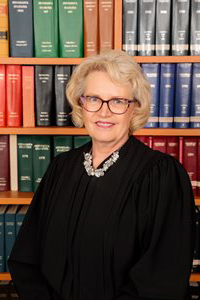District Court Judge

Anoka County
View state court bio
Contact with Chambers
• To whom may attorneys direct scheduling/logistical questions? Jennifer Jelinski at 763-760-6598
• To whom may attorneys direct substantive questions? Law clerk, Curtis Cook (see above)
• Set forth your practices and procedures for scheduling motion hearings. Contact scheduling clerk or law clerk.
• Identify any type of motion for which you do not require a hearing. Amend scheduling order; continuances; discovery disputes.
• Do you accept telephone calls from attorneys to rule on discovery disputes that occur during depositions? Yes.
• How much time do you allot for motion hearings? 30 minutes unless longer is requested in advance.
• Set forth your practices and procedures with respect to attending a hearing by telephone or video conference. All motions are heard via Zoom unless in-person is requested.
• Set forth your practices and procedures with respect to discovery motions. Request an informal phone conference to see if issues can be resolved without need for hearing.
• Set forth your practices and procedures with respect to stipulations of the parties, including stipulations for protective orders. File with court and await approval. If I have questions or concerns, my law clerk will contact counsel.
• Do you have any particular requests or procedures relating to requests to amend the scheduling order? I only have 3 civil trial weeks per year. It's best to contact my chambers and find out what those dates are before submitting the Stipulation to Amend Scheduling Order.
• Set forth your practices and procedures with respect to default proceedings. All administrative defaults are routed to a judge for approval in Anoka County. If a hearing is set, it will be a remote hearing. Contact Jennifer Jelinski (see above) to schedule the hearing.
• Set forth your practices and procedures with respect to handling emergency motions. Contact my law clerk to schedule.
• Do you want to receive paper courtesy copies of the parties' written submissions? If you do, set forth the number of courtesy copies and identify any document type you do not want to receive. No.
• Set forth your preferences for handling informal requests for relief using the expedited, informal non-dispositive motion process set forth in Minn. Gen. R. practice 115.04(d). E-file correspondence, copied to opposing counsel/parties, requesting a phone or videoconference with the court.
Pre-Trial Procedures
• Describe your preferred procedures for pretrial settlement conferences, including the timing of such conferences, persons who must attend, whether persons may attend by telephone or video conference, and how you participate in settlement discussions. Pre-Trial settlement conferences are not routinely set; contact my law clerk well in advance of the trial date in order to request a settlement conference. If one is set, it will likely be in person and all persons necessary for approving any settlement must be present.
• Identify what technology you use in the courtroom and state whether you prefer a particular electronic format. Varies by case. All Anoka trial courtrooms have monitors but counsel typically bring their own laptops and any other audio-visual equipment. Proposed Exhibits are to be uploaded into the MNDES/OnBase system which specifies the formats allowed.
• Set forth your practices and procedures with respect to attorney’s use of technology in the courtroom and during trial. Varies by case.
• Do you permit parties to bifurcate oral argument so different attorneys address different legal issues? Yes.
In-Person Trials
• Are you willing to provide a date certain for trial? I am unable to do so in most cases. Occasionally I will provide a date certain for a court (not jury) trial if it is two days or fewer.
• Set forth your practices and procedures for handling motions in limine. As set forth in my Scheduling Orders, file at least 7 days prior to trial. If there are extensive issues, the 1 half-day of trial may be reserved for arguing motions.
• What is your schedule for a typical trial day? 9:00-4:30 or 5:00 p.m.
• Set forth your voir dire procedures. Judge asks background questions and gives basic instructions on the law; explains claims, then allows attorneys to question the panel.
• Set forth your practices and procedures with respect to courtroom decorum, including movement in the courtroom, use of a podium, whether attorneys should sit or stand, and how to address witnesses. Attorneys may sit unless using the podium.
• Do you impose time limits with respect to opening statements and closing arguments? I have never needed to impose time limits.
• Set forth your practices and procedures with respect to marking and using exhibits. All exhibits should be uploaded into MNDES/OnBase system and numbered as directed.
• For exhibits uploaded to the Minnesota Digital Exhibit System (MNDES), set forth your preferences regarding naming conventions for files uploaded to the system. I think the system prescribes naming conventions.
• Set forth your practices and procedures with respect to handling objections. State the legal basis in one or two words; wait for ruling or request to approach the bench for argument out of the presence of the jury.
• May attorneys obtain daily transcripts during trial? If so, what procedure should attorneys follow? It depends on the court reporter so I can't answer this question.
• Set forth your practices and procedures with respect to attorney requests to contact jurors at the conclusion of trial. No one has ever asked me to do this.
• Set forth any other preferences, practices, or procedures attorneys and parties may find helpful. Brief any unusual evidentiary issues in writing, in advance of trial or motions in limine.